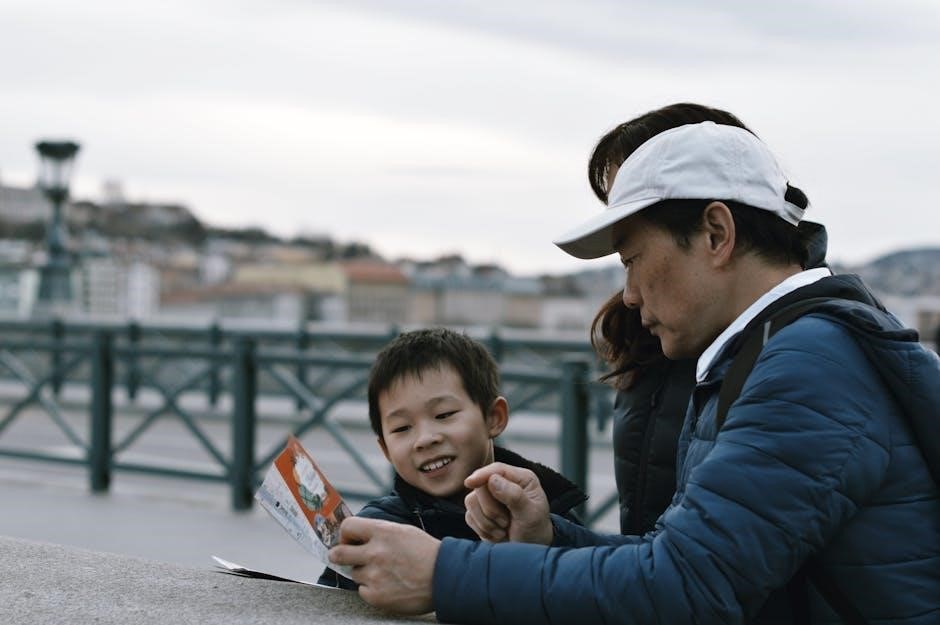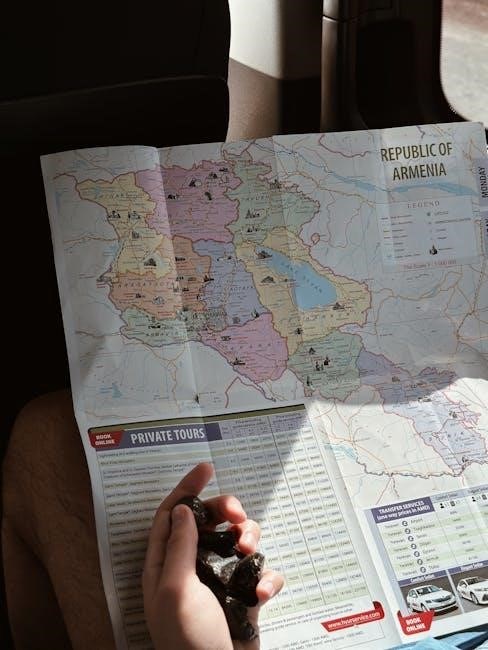Filipino tour guides are known for their warm hospitality and extensive knowledge of the Philippines’ rich history, vibrant culture, and breathtaking destinations, ensuring unforgettable experiences for tourists.

Roles and Responsibilities
Filipino tour guides plan itineraries, provide historical insights, ensure safety, and handle emergencies, while adapting to diverse tourist needs and maintaining professional conduct throughout the tour.
2.1 Itinerary Planning
Filipino tour guides excel in creating personalized and engaging itineraries tailored to tourists’ preferences, ensuring a smooth and memorable experience. They meticulously plan each day, considering factors like travel time, weather conditions, and peak tourist hours. Whether it’s exploring historical sites, relaxing on beaches, or immersing in local culture, guides craft schedules that maximize enjoyment and efficiency. Their expertise in sequencing activities ensures a balanced mix of relaxation and exploration, catering to diverse interests. By prioritizing flexibility, they adapt plans to unexpected changes, such as weather disruptions or tourist requests. This attention to detail and commitment to seamless execution highlight their dedication to delivering unforgettable journeys across the Philippines’ stunning landscapes and vibrant culture.
2.2 Historical and Cultural Context
Filipino tour guides are deeply knowledgeable about the Philippines’ rich history, offering insights into its colonial past, indigenous traditions, and cultural evolution. They provide detailed narratives about historical landmarks, such as Intramuros and the Spanish-era churches, while sharing stories of the country’s resilience and independence. Guides also highlight the vibrant cultural practices, festivals, and traditions that define Filipino identity. By weaving historical facts with personal anecdotes, they create engaging and educational experiences for tourists. Their ability to bridge the past and present ensures visitors gain a profound appreciation for the Philippines’ unique heritage and its people’s warm spirit.
2.3 Safety and Emergency Handling

Filipino tour guides prioritize the safety and well-being of their tourists, ensuring a secure and enjoyable experience. They are trained to assess potential risks and implement safety measures, especially in adventurous or remote destinations. Guides are well-prepared to handle emergencies, such as medical situations or natural disasters, with knowledge of first aid and emergency protocols. They maintain open communication with tour groups, providing clear instructions and reassurance during crises. Their quick thinking and problem-solving skills help mitigate challenges, ensuring that tours continue smoothly. By staying informed about local conditions and potential hazards, Filipino tour guides demonstrate a commitment to protecting their guests, making them reliable companions in exploring the Philippines’ diverse landscapes and cultural attractions.

Essential Skills
Filipino tour guides excel in communication, local knowledge, and adaptability, ensuring seamless interactions and problem-solving during tours, while providing accurate information and unforgettable experiences for visitors.
3.1 Communication Skills
Filipino tour guides are renowned for their exceptional communication skills, which are vital for ensuring seamless interactions with tourists. They are often fluent in English and local dialects, allowing them to connect with both international and domestic visitors. Their ability to articulate historical and cultural details clearly and engagingly enhances the tour experience. Active listening and adaptability in communication enable them to address diverse needs and preferences effectively. Moreover, their warm and hospitable nature fosters a welcoming environment, making tourists feel comfortable and valued. These skills are further complemented by their ability to handle conflicts and misunderstandings with grace, ensuring memorable and stress-free journeys for all.
3.2 Local Knowledge and Expertise
Filipino tour guides possess deep knowledge of the Philippines’ history, culture, and geography, making them invaluable resources for tourists. Their expertise spans from historical landmarks to hidden natural gems, ensuring visitors experience the country’s authentic beauty. Fluent in both English and local dialects, they can effortlessly communicate with diverse groups, providing insights into regional customs and traditions. Their familiarity with local cuisine, festivals, and cultural practices allows them to create immersive experiences tailored to visitors’ interests. Whether navigating bustling cities or remote islands, their extensive local knowledge ensures smooth and enriching journeys. This expertise not only enhances the tour quality but also fosters a deeper appreciation for the Philippines’ unique heritage, making Filipino tour guides indispensable companions for any traveler.
3.3 Adaptability and Problem-Solving
Filipino tour guides excel in adaptability and problem-solving, ensuring seamless experiences for tourists. They are adept at handling unexpected situations, such as weather changes or last-minute itinerary adjustments, with grace and efficiency. Their ability to think on their feet allows them to transform potential setbacks into memorable moments. Whether resolving transportation issues or finding alternative attractions, their resourcefulness shines. Guides are also skilled at tailoring tours to meet diverse preferences, ensuring every traveler feels accommodated. This flexibility, combined with a positive attitude, makes Filipino tour guides exceptional at delivering stress-free and enjoyable journeys. Their problem-solving skills are rooted in a deep understanding of local logistics and a commitment to providing unforgettable experiences.

Cultural Insights and Etiquette
Filipino tour guides provide valuable insights into the country’s rich culture, traditions, and social norms, helping tourists navigate local customs with respect and confidence during their visits.

4.1 Understanding Filipino Hospitality
Filipino hospitality is renowned for its warmth and generosity, rooted in deep cultural values of respect, family, and community. Tour guides often highlight how locals welcome visitors with open arms, ensuring they feel at home. This hospitality is reflected in the traditional Filipino greeting, “Mabuhay!”, which embodies a heartfelt welcome. Filipinos take pride in sharing their customs, such as offering refreshments upon arrival or engaging in lively conversations. Respect for elders and the use of polite expressions like “opo” (yes) or “po” (a sign of respect) are integral to interactions. Guides emphasize the importance of these traditions, helping tourists appreciate the genuine kindness and inclusive nature of the Filipino people.
By understanding these cultural nuances, visitors can foster meaningful connections and experience the true essence of Filipino hospitality during their travels.
4.2 Etiquette Tips for Tourists
Understanding Filipino etiquette is essential for a respectful and enjoyable experience. Tourists should respect elders by using polite expressions like “opo” or “po” when speaking to older individuals. Removing shoes before entering homes or traditional establishments is also a common courtesy. Public displays of affection are generally frowned upon, and loud conversations in quiet spaces should be avoided. Additionally, it’s polite to avoid finishing a meal completely, as it may imply the host did not provide enough food. These small gestures reflect respect for Filipino customs and values.
Dressing modestly when visiting churches or attending cultural events is highly appreciated. Following these etiquette tips ensures a harmonious and enriching experience for both tourists and locals alike.
4.3 Festivals and Celebrations
The Philippines is renowned for its vibrant festivals, which showcase its rich cultural heritage. One of the most famous is the Sinulog Festival in Cebu, honoring Santo Niño with grand parades and street dancing. The MassKara Festival in Bacolod, known as the “City of Smiles,” features colorful masks and lively celebrations. Another notable event is the Pahiyas Festival in Lucban, where houses are adorned with intricate decorations made from rice grains and flowers. These festivals are not only entertaining but also reflect the deep-rooted traditions and faith of the Filipino people. Tourists can immerse themselves in the music, dance, and local cuisine, making these events unforgettable experiences.
Attending these festivals offers a unique glimpse into the country’s soul and its people’s joy in celebration.

Popular Destinations in the Philippines
The Philippines boasts iconic destinations like Boracay, Palawan, and Cebu, offering stunning beaches, crystal-clear waters, and rich cultural heritage, attracting millions of tourists annually.
5;1 Beaches and Islands
The Philippines is renowned for its stunning beaches and picturesque islands, offering a tropical paradise for travelers. Boracay, with its iconic White Beach, captivates visitors with its pristine sands and vibrant nightlife. Palawan, often hailed as the world’s best island, features breathtaking destinations like El Nido and Coron, known for their crystal-clear lagoons and towering limestone cliffs. Siargao, the surfing capital of the Philippines, attracts adventure-seekers with its powerful waves and laid-back vibe. Cebu, meanwhile, boasts beautiful beaches, diving spots, and historic sites like Magellan’s Cross. These destinations, along with countless hidden gems, showcase the Philippines’ diverse natural beauty, making it a must-visit for beach lovers and island hoppers alike. Each location offers unique experiences, from relaxation to adventure, ensuring unforgettable memories for every traveler.
5.2 Historical Landmarks
The Philippines is home to a wealth of historical landmarks that reflect its rich cultural and colonial heritage. Intramuros, the walled city of Manila, stands as a testament to Spanish influence, featuring iconic sites like Fort Santiago and San Agustin Church. The Barasoain Church in Malolos, known as the “Cradle of Democracy,” highlights the nation’s fight for independence. Other significant landmarks include the Magellan’s Cross in Cebu, symbolizing the arrival of Christianity, and the Blood Compact Site in Bohol, commemorating the historic treaty between Spanish conquistadors and local rulers. These landmarks offer deeper insights into the Philippines’ history, allowing tourists to connect with the nation’s past and appreciate its journey toward independence and modern identity. Visiting these sites is a must for anyone seeking to understand the country’s enduring legacy.
5.3 Adventure and Nature Spots
The Philippines offers a diverse array of adventure and nature spots that cater to all kinds of explorers. From the iconic Chocolate Hills in Bohol to the breathtaking scenery of Batanes, the country is a paradise for nature enthusiasts. Adventure seekers can hike through the lush trails of Mount Pulag or explore the stunning caves of Sagada. Meanwhile, the crystal-clear waters of El Nido and Coron provide perfect opportunities for snorkeling, diving, and island hopping. For those seeking adrenaline-pumping activities, the Pagsanjan Falls in Laguna and the rapids of Kalinga offer thrilling experiences. The Philippines’ rich biodiversity, including its vibrant forests and unique wildlife, makes it a top destination for eco-tourism and outdoor adventures, ensuring unforgettable experiences for every kind of traveler.

Legal and Professional Requirements
Filipino tour guides must obtain proper licensing and certification from the Department of Tourism to operate legally, ensuring they meet professional standards and provide quality services to tourists.
6.1 Licensing and Certification
Filipino tour guides are required to obtain proper licensing and certification from the Department of Tourism (DOT) to ensure they meet professional standards. The certification process involves training and exams to test their knowledge of local history, culture, and safety protocols. Guides must also undergo background checks to guarantee tourist safety. Certification ensures that tour guides are well-equipped to provide accurate information and handle emergencies effectively. Renewal of licenses is typically required periodically to stay updated with industry developments. These requirements help maintain the quality of tourism services and build trust among visitors. Licensing also ensures that guides are aware of environmental and cultural preservation practices, contributing to sustainable tourism. By adhering to these standards, Filipino tour guides play a crucial role in promoting the country’s heritage and natural beauty responsibly.
6.2 Professional Affiliations
Filipino tour guides often join professional associations to enhance their credibility and expertise. The Department of Tourism (DOT) encourages guides to affiliate with recognized organizations, such as the World Federation of Tourist Guide Associations (WFTGA), to maintain global standards. These affiliations provide access to training, updated regulations, and networking opportunities. Many guides are also members of local associations, such as the Philippine Tour Guides Association of the Philippines (PTGAP), which focuses on promoting ethical practices and preserving cultural heritage. Professional affiliations ensure that guides are informed about the latest tourism trends and safety protocols, fostering trust and confidence among tourists. By being part of these organizations, Filipino tour guides contribute to the growth of a responsible and sustainable tourism industry.

Customer Reviews and Testimonials
Customer reviews and testimonials consistently highlight the dedication and expertise of Filipino tour guides. Many travelers praise their extensive knowledge of local history, culture, and hidden gems, which enhances the travel experience. Guides are often commended for their warm hospitality, ensuring visitors feel welcome and at ease. Reviews frequently mention their ability to handle logistics seamlessly, allowing travelers to focus on enjoying their journey. The personalized attention and genuine passion for sharing the Philippines’ beauty shine through in testimonials. Overall, the positive feedback underscores the professionalism and heartfelt service that Filipino tour guides provide, making their contributions invaluable to the country’s tourism industry.

The Economic Impact of Tourism
Tourism plays a vital role in the Philippine economy, contributing significantly to GDP and employment. Filipino tour guides are integral to this industry, as their expertise attracts millions of visitors annually. The tourism sector supports livelihoods, from small businesses to large enterprises, fostering economic growth. By promoting local destinations, tour guides help generate revenue for communities, enhancing infrastructure and services. Sustainable tourism practices, encouraged by guides, also preserve natural and cultural heritage, ensuring long-term economic benefits. The influx of tourists stimulates demand for accommodations, dining, and transportation, further boosting the economy. As tourism grows, so does the demand for skilled guides, creating more opportunities. Thus, Filipino tour guides are not only cultural ambassadors but also key contributors to the nation’s economic development.
